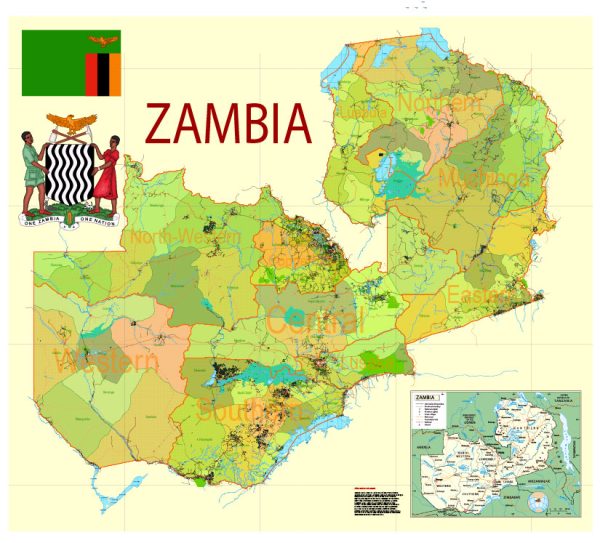Zambia is a landlocked country located in Southern Africa. Here are some key facts about Zambia:
- Capital and Largest City: Lusaka is the capital city and the largest city in Zambia.
- Geography: Zambia is known for its diverse geography, which includes plateaus, mountains, and valleys. The Zambezi River flows through the country, forming the famous Victoria Falls, one of the largest and most spectacular waterfalls in the world.
- Independence: Zambia gained its independence from British colonial rule on October 24, 1964. The country was previously known as Northern Rhodesia.
- Government: Zambia is a republic with a democratic government. The President of Zambia serves as both the head of state and government.
- Official Language: English is the official language, but there are numerous indigenous languages spoken throughout the country, with Bemba being one of the most widely spoken.
- Economy: Zambia’s economy is largely based on copper mining, and it is one of the world’s largest producers of copper. Agriculture, manufacturing, and tourism also contribute to the economy.
- National Parks and Wildlife: Zambia is known for its abundant natural beauty and wildlife. The country is home to several national parks and game reserves, making it a popular destination for safaris and eco-tourism.
- Culture: The culture of Zambia is diverse, influenced by various ethnic groups. Traditional music and dance play an important role in Zambian culture, and the country celebrates various festivals and events throughout the year.
- Education: Education in Zambia is based on a British model, with primary, secondary, and tertiary education levels. The government has made efforts to improve access to education in recent years.
- Health: Zambia faces health challenges, including high rates of HIV/AIDS. The government, along with international organizations, has been working to address these health issues.
- Currency: The currency of Zambia is the Zambian Kwacha (ZMW).
- Tourism: Zambia is known for its natural beauty and offers attractions like Victoria Falls, South Luangwa National Park, and Lower Zambezi National Park. Tourists visit Zambia for wildlife safaris, adventure sports, and cultural experiences.
- Political History: Zambia has a history of stable and peaceful transitions of power through democratic elections. The country’s first president, Kenneth Kaunda, played a significant role in the struggle for independence and in shaping the early post-independence political landscape.
- Infrastructure: Zambia has a developing infrastructure, with road and rail networks connecting major cities and regions. The country has made efforts to improve its infrastructure to support economic growth.
- Challenges: Zambia faces challenges like poverty, healthcare issues, and economic inequality. The government has been working to address these challenges while also promoting economic growth and development.


 Author: Kirill Shrayber, Ph.D. FRGS
Author: Kirill Shrayber, Ph.D. FRGS